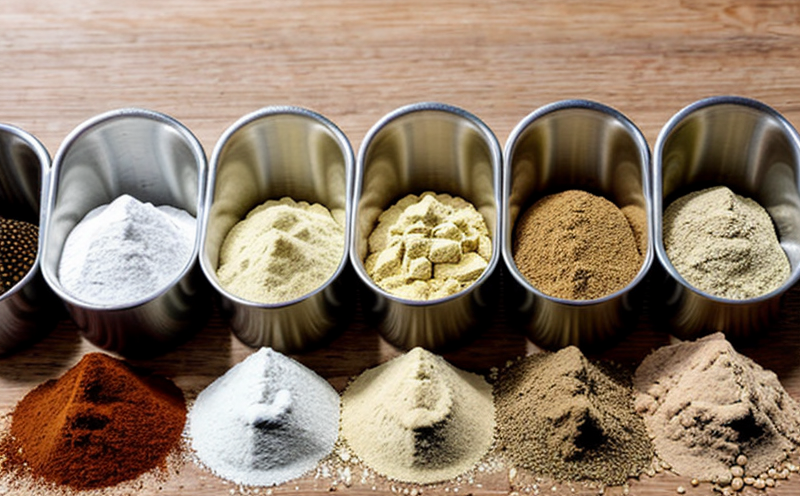EN 21063 Iodine Residue Analysis in Dairy-Based Feed
The European standard EN 21063 specifies a method for determining iodine residues in dairy-based feed. This test is crucial for ensuring the safety and compliance of animal feeds, particularly those destined for ruminants like cows, sheep, and goats. Ensuring adequate levels of essential trace elements such as iodine is vital for maintaining animal health and productivity. However, excessive or inappropriate use can lead to adverse effects on animal health, including thyroid disorders.
The testing procedure outlined in EN 21063 involves the extraction of iodine from a dairy-based feed sample using a suitable solvent followed by titration with a standard silver nitrate solution. The amount of iodine is then calculated based on the volume of silver nitrate consumed during the reaction. This method provides precise and accurate results, which are essential for regulatory compliance.
Sample preparation is critical to obtaining reliable test results. A representative sample must be taken from the feed batch or lot. Typically, this involves crushing the sample into a fine powder using appropriate equipment such as a mill or grinder. The powdered sample should then be homogenized before taking an aliquot for analysis.
The selected equipment and instrumentation are crucial to ensure accurate results. A precise analytical balance is used to weigh the sample accurately, while a volumetric pipette ensures that standard solutions are dispensed correctly during titration. For the titration process itself, a burette provides precision in measuring small volumes of silver nitrate solution.
Acceptance criteria for this test specify that the iodine content must fall within predetermined limits set by relevant standards and regulations. In the case of dairy-based feed intended for ruminants, these limits are based on the expected dietary requirements of the animals, as outlined in international standards such as ISO 6521:2017 and EN 12893-4.
The importance of this test cannot be overstated. It ensures that dairy-based feeds meet the necessary iodine levels required for optimal animal health while preventing any potential overuse or misuse of iodine supplements. This is particularly important given the prevalence of iodine deficiency in many regions, which can lead to suboptimal performance and increased susceptibility to disease.
Real-world applications of this test are widespread, ranging from large-scale feed manufacturers to smallholder farmers who produce dairy products for local markets. By ensuring compliance with international standards like EN 21063, these stakeholders can protect their reputations and ensure that they meet regulatory requirements. Additionally, the use of accurate testing methods helps to build trust among consumers regarding the safety and quality of the final dairy products.
In conclusion, EN 21063 is a vital tool for ensuring the safety and compliance of dairy-based feeds. Its precise and reliable results are essential for maintaining animal health and productivity while preventing any potential risks associated with iodine residues. By adhering to this standard, stakeholders in the food & feed sector can ensure that their products meet international standards and regulations.
Why Choose This Test
Selecting EN 21063 for iodine residue analysis offers several benefits for quality managers, compliance officers, R&D engineers, and procurement professionals within the food & feed sector. Firstly, it ensures that dairy-based feeds comply with international standards such as ISO 6521:2017 and EN 12893-4, which are specifically designed to address iodine deficiency in ruminants.
Secondly, this test provides a precise and accurate method for determining the amount of iodine present in dairy-based feeds. This level of accuracy is crucial for ensuring that feed meets the necessary dietary requirements of animals while preventing any potential overuse or misuse of iodine supplements. Overuse can lead to thyroid disorders, which can negatively impact animal health and productivity.
Thirdly, using EN 21063 ensures consistency in testing across different batches or lots of dairy-based feed. This consistency is essential for maintaining high-quality standards within the sector and building trust among consumers regarding the safety and quality of final dairy products. By adhering to this standard, stakeholders can ensure that their products meet international standards and regulations.
Lastly, compliance with EN 21063 helps protect the reputation of food & feed manufacturers and distributors. In an era where consumer demand for safe and high-quality products is increasing, ensuring adherence to recognized testing methods such as this one can provide a competitive edge in the market.
Quality and Reliability Assurance
- Representative Sample Collection: Ensuring that the sample taken for analysis accurately represents the entire batch or lot of feed is crucial. This involves taking multiple subsamples from different parts of the batch and mixing them thoroughly before selecting a representative aliquot.
- Precision Equipment: The use of precise analytical balances, volumetric pipettes, burettes, and other laboratory instruments ensures that all measurements are accurate. This precision is essential for obtaining reliable results.
The accuracy and reliability of the test results depend heavily on these factors. By adhering to strict protocols for sample preparation and using high-quality equipment, laboratories can ensure consistent and repeatable results. This consistency is crucial for maintaining trust in the food & feed sector and ensuring that products meet international standards.
Competitive Advantage and Market Impact
- Reputation Management: Adherence to recognized testing methods such as EN 21063 can significantly enhance a company's reputation. In an increasingly competitive market, maintaining high-quality standards is key to differentiating oneself from competitors.
- Consumer Trust: Ensuring that dairy-based feeds meet the necessary iodine levels required for optimal animal health while preventing any potential risks associated with iodine residues can help build trust among consumers. This trust is crucial in gaining market share and maintaining customer loyalty.
In addition to these benefits, compliance with international standards like EN 21063 can open up new markets for food & feed manufacturers and distributors. By adhering to recognized testing methods, companies can expand their reach into regions where there is a growing demand for safe and high-quality products.





